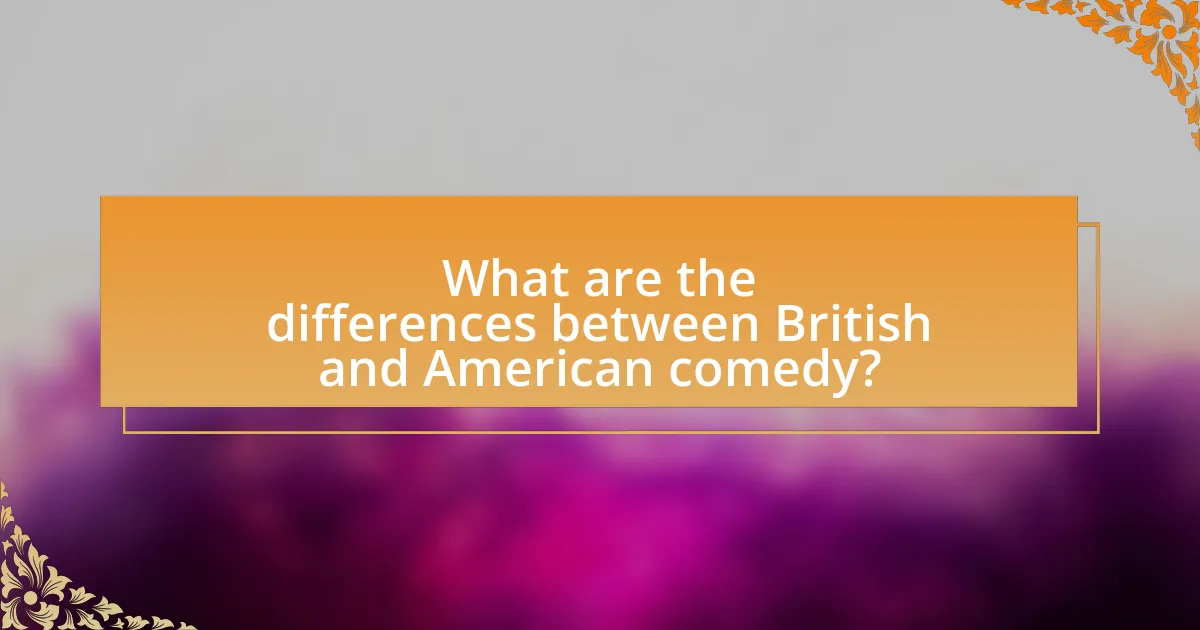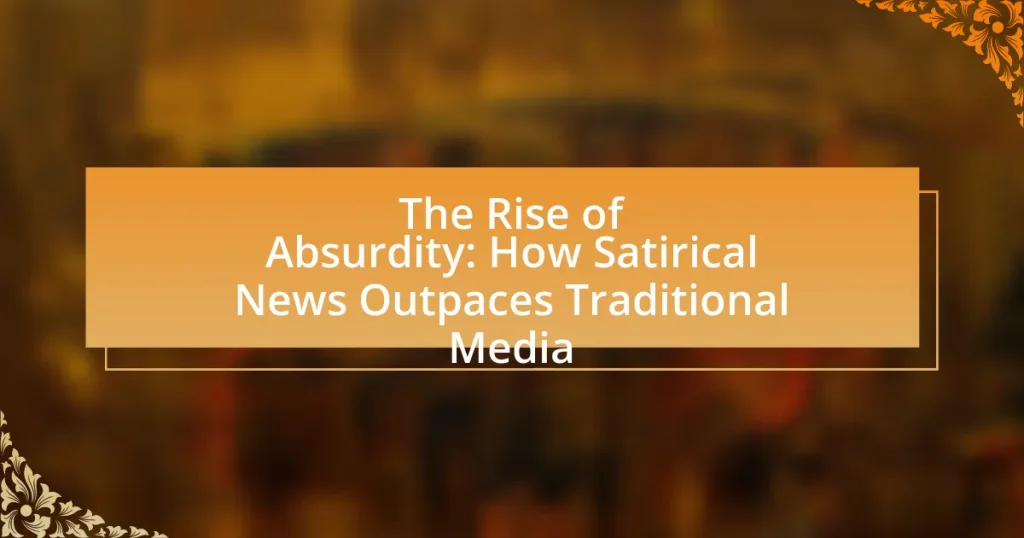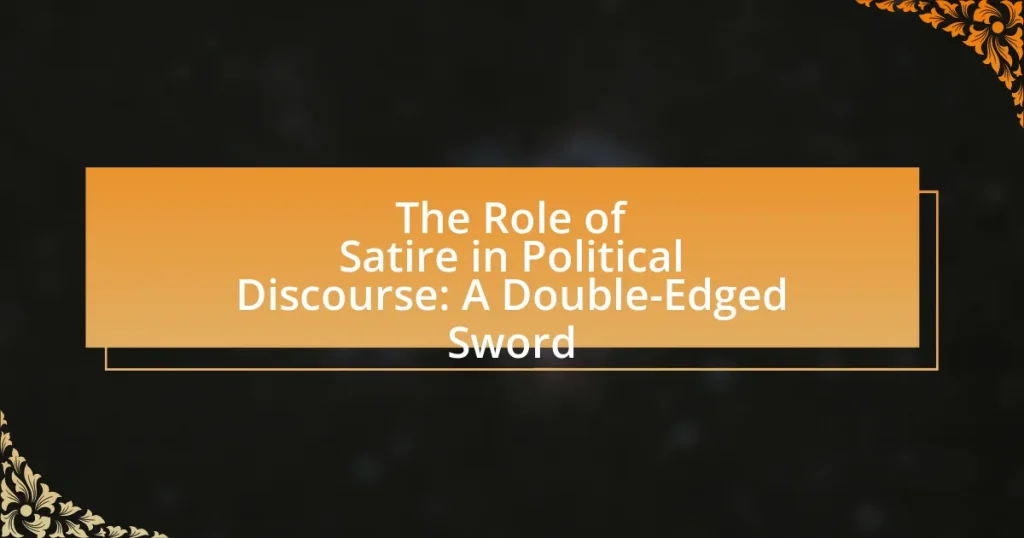The article examines the significant influence of British humor on American comedy, highlighting key elements such as irony, satire, and absurdity that have shaped comedic styles across the Atlantic. It traces the historical impact of British performers and writers, including the introduction of satirical elements in early 20th-century American entertainment and the cultural exchanges facilitated by events like the British Invasion and World War II. The article also identifies pivotal British comedians who have shaped American humor, discusses the characteristics of British comedy, and explores how American shows and comedians have adopted these techniques, ultimately enriching the comedic landscape in the United States.

What is the Influence of British Humor on American Comedy?
British humor has significantly influenced American comedy by introducing elements such as irony, satire, and absurdity. This influence is evident in various American television shows and films that adopt a dry wit and self-deprecating humor, characteristics often associated with British comedy. For instance, shows like “The Office” (U.S.) and “Parks and Recreation” draw inspiration from the British version of “The Office,” showcasing similar comedic styles that emphasize awkward social interactions and deadpan delivery. Additionally, comedians like Ricky Gervais and John Cleese have had a notable impact on American stand-up and sitcom formats, further blending British humor into the American comedic landscape. This cross-pollination has enriched American comedy, making it more diverse and layered.
How did British humor first impact American comedy?
British humor first impacted American comedy through the introduction of satirical and absurdist elements in the early 20th century. This influence became evident with the arrival of British performers and writers, such as Charlie Chaplin and the Monty Python troupe, who brought a distinct style characterized by wit, irony, and social commentary. The incorporation of these elements into American vaudeville and later television shows, like “The Dick Van Dyke Show,” showcased the blending of British comedic sensibilities with American humor, leading to a richer comedic landscape. The success of British comedies, particularly in the 1960s and 1970s, further solidified this impact, as American audiences embraced the unique storytelling and character-driven humor that originated from Britain.
What historical events facilitated the exchange of comedic styles?
The exchange of comedic styles between British and American comedy was facilitated by several historical events, notably the British Invasion of the 1960s, the rise of television, and the impact of World War II. The British Invasion, characterized by the popularity of British bands and television shows in the U.S., introduced American audiences to British humor, exemplified by shows like “The Beatles” and “Monty Python’s Flying Circus.” The rise of television in the mid-20th century allowed for the widespread dissemination of comedic styles across the Atlantic, with programs such as “The Office” and “Absolutely Fabulous” influencing American sitcoms. Additionally, World War II fostered cultural exchanges as American and British troops interacted, leading to a blending of comedic sensibilities that shaped post-war entertainment. These events collectively contributed to the evolution and integration of comedic styles between the two cultures.
Which British comedians were pivotal in shaping American humor?
British comedians who were pivotal in shaping American humor include Monty Python, particularly through their television series and films, which introduced absurdist and surreal comedy to American audiences. Additionally, figures like Benny Hill and Richard Pryor, who was influenced by British comedic styles, contributed to the evolution of American stand-up and sketch comedy. The influence of British humor is evident in shows like “Saturday Night Live,” which adopted elements from British sketch comedy, showcasing the cross-cultural impact.
What are the key characteristics of British humor?
British humor is characterized by its wit, irony, and self-deprecation. This style often employs clever wordplay and puns, showcasing a fondness for the absurd and the surreal. Additionally, British humor frequently includes a dry delivery, where the comedic effect relies on understated expressions rather than overt exaggeration. Historical context supports this, as British comedy has evolved through various forms, such as satire and farce, which highlight social norms and human folly, exemplified in works by figures like Monty Python and The Office.
How does irony play a role in British comedic style?
Irony is a fundamental element of British comedic style, characterized by the expression of meaning through language that signifies the opposite, often highlighting absurdities in everyday life. This use of irony allows British comedians to create humor that is both subtle and sophisticated, often relying on the audience’s ability to recognize the discrepancy between what is said and what is meant. For instance, shows like “The Office,” created by Ricky Gervais, exemplify this style through deadpan delivery and situational irony, where characters often find themselves in ludicrous situations that reflect social norms and expectations. The effectiveness of irony in British comedy is further supported by its historical roots in literature, such as the works of Oscar Wilde and George Bernard Shaw, who employed irony to critique societal issues, thus establishing a tradition that continues to influence contemporary comedic forms.
What is the significance of self-deprecation in British humor?
Self-deprecation is significant in British humor as it reflects cultural values of humility and self-awareness. This comedic style allows individuals to connect with audiences by showcasing vulnerability, making humor more relatable and accessible. Historical figures like Winston Churchill and comedians such as Ricky Gervais exemplify this approach, using self-deprecation to diffuse tension and critique societal norms. Research indicates that self-deprecating humor can enhance social bonds and reduce perceived social distance, reinforcing its importance in British comedic tradition.
How has American comedy evolved under British influence?
American comedy has evolved significantly under British influence by incorporating elements of wit, irony, and character-driven humor. The introduction of British sitcoms, such as “Fawlty Towers” and “The Office,” has shaped American comedic styles, leading to a greater emphasis on character development and situational comedy. Additionally, British stand-up comedians like Ricky Gervais and Eddie Izzard have inspired American comedians to adopt more self-deprecating humor and observational comedy techniques. This cross-pollination has resulted in a richer comedic landscape in the U.S., blending British sensibilities with American cultural themes, ultimately enhancing the depth and variety of American comedy.
What are the notable American comedy shows inspired by British humor?
Notable American comedy shows inspired by British humor include “The Office,” “Parks and Recreation,” and “Cougar Town.” “The Office,” adapted from the British series of the same name, retains the mockumentary style and character-driven humor that characterized the original. “Parks and Recreation” draws on similar comedic elements, emphasizing quirky characters and satirical takes on government, akin to British sitcoms. “Cougar Town,” while not a direct adaptation, reflects British humor’s influence through its ensemble cast and witty dialogue. These shows exemplify how British comedic styles have shaped American television, showcasing character-driven narratives and situational humor.
How have American comedians adopted British comedic techniques?
American comedians have adopted British comedic techniques primarily through the incorporation of dry humor, irony, and self-deprecation. These elements are evident in the work of comedians like Ricky Gervais and John Cleese, whose styles have influenced American counterparts such as Steve Carell and Tina Fey. The success of British sitcoms like “The Office,” which was adapted into an American version, showcases how American humor has embraced the subtlety and wit characteristic of British comedy. Additionally, the rise of stand-up comedians who utilize observational humor and social commentary reflects the impact of British comedic traditions on American comedy.

What are the differences between British and American comedy?
British and American comedy differ primarily in their humor styles, cultural references, and pacing. British comedy often employs dry wit, irony, and satire, frequently relying on social commentary and character-driven humor, as seen in shows like “The Office” (UK) and “Fawlty Towers.” In contrast, American comedy tends to focus on broader humor, punchlines, and situational comedy, exemplified by series like “Friends” and “The Big Bang Theory.” Additionally, British humor often embraces absurdity and self-deprecation, while American humor typically emphasizes optimism and relatability. These distinctions reflect the cultural contexts and societal norms of each country, influencing how humor is crafted and received.
How do cultural contexts shape comedic styles in both countries?
Cultural contexts significantly shape comedic styles in both Britain and America by influencing humor’s themes, delivery, and audience reception. In Britain, humor often relies on irony, sarcasm, and self-deprecation, reflecting a cultural preference for subtlety and wit, as seen in shows like “The Office” and “Monty Python’s Flying Circus.” Conversely, American comedy tends to emphasize directness, exaggeration, and observational humor, which aligns with a cultural inclination towards openness and relatability, evident in sitcoms like “Friends” and “The Big Bang Theory.” These differences stem from historical factors, social norms, and values unique to each country, such as Britain’s class system and America’s individualism, which dictate what is considered funny and acceptable in comedic expression.
What role does social commentary play in British versus American comedy?
Social commentary serves as a critical lens through which British and American comedy reflect societal issues, but they do so in distinct ways. British comedy often employs irony and satire to critique social norms, politics, and class structures, as seen in shows like “The Office” and “Yes Minister,” which highlight the absurdities of bureaucracy and social hierarchies. In contrast, American comedy tends to focus on individualism and personal experiences, using humor to address broader societal issues, as exemplified by shows like “Saturday Night Live” and “The Daily Show,” which often engage in political satire but with a more direct approach to personal and cultural identity. This difference illustrates how British comedy leans towards subtlety and nuance, while American comedy often embraces overt commentary and relatability, reflecting the cultural values and social dynamics of each society.
How do audience expectations differ between British and American humor?
Audience expectations differ significantly between British and American humor, primarily due to cultural nuances and comedic styles. British humor often emphasizes irony, understatement, and a dry delivery, leading audiences to appreciate subtlety and wit. In contrast, American humor tends to favor directness, slapstick, and a more overt comedic approach, which aligns with a preference for clear punchlines and high-energy delivery. This distinction is supported by the success of shows like “The Office,” where the British version relies on awkward pauses and subtle character interactions, while the American adaptation incorporates broader humor and faster pacing to cater to American tastes.
What are the common themes found in both British and American comedy?
Common themes found in both British and American comedy include satire, absurdity, and social commentary. Satire is prevalent in both cultures, often targeting politics and societal norms, as seen in British shows like “The Office” and American counterparts like “Saturday Night Live.” Absurdity is another shared theme, with both British comedies such as “Monty Python’s Flying Circus” and American series like “Rick and Morty” employing surreal humor to challenge reality. Social commentary is also significant, as both British and American comedies reflect and critique cultural issues, evident in shows like “The IT Crowd” in Britain and “The Fresh Prince of Bel-Air” in the U.S. These themes demonstrate the interconnectedness of humor across both cultures, influencing each other over time.
How do both styles address topics like class and politics?
Both British humor and American comedy address topics like class and politics through satire and social commentary. British humor often critiques the class system, highlighting the absurdities of the upper class and the struggles of the working class, as seen in shows like “Fawlty Towers” and “The Office,” which expose class disparities and social norms. American comedy, on the other hand, frequently tackles political issues and class struggles, using shows like “Saturday Night Live” and “The Daily Show” to satirize political figures and policies, reflecting the socio-political landscape. Both styles utilize humor as a lens to examine and critique societal structures, making complex issues accessible and engaging for audiences.
What similarities exist in the use of absurdity in both comedic traditions?
Both British and American comedic traditions utilize absurdity to challenge societal norms and expectations. In both traditions, absurdity serves as a tool to highlight the ridiculousness of everyday situations, often leading to humor that resonates with audiences by exposing the illogical aspects of life. For instance, British humor often employs dry wit and surreal scenarios, as seen in shows like “Monty Python’s Flying Circus,” while American comedy, exemplified by series like “The Simpsons,” similarly embraces absurd situations to critique cultural norms. This shared approach underscores a universal comedic strategy that leverages the unexpected to provoke laughter and reflection.

What are the contemporary examples of British influence on American comedy?
Contemporary examples of British influence on American comedy include shows like “The Office,” which was adapted from the British series created by Ricky Gervais, and “Veep,” which features a comedic style reminiscent of British political satire. Additionally, comedians such as John Cleese and Ricky Gervais have had significant impacts on American humor through their stand-up routines and television appearances. The use of dry wit, irony, and absurdity in American comedies often reflects British comedic traditions, demonstrating a clear lineage of influence.
Which current American shows reflect British comedic elements?
Current American shows that reflect British comedic elements include “The Office,” “Brooklyn Nine-Nine,” and “Ted Lasso.” “The Office” adopts a mockumentary style similar to the original British version, utilizing deadpan humor and awkward social interactions. “Brooklyn Nine-Nine” incorporates witty banter and character-driven comedy reminiscent of British sitcoms. “Ted Lasso” showcases a blend of optimism and dry humor, drawing parallels to British comedy’s focus on character development and heartfelt storytelling. These shows exemplify the influence of British humor on American television through their narrative styles and comedic techniques.
How do these shows incorporate British humor techniques?
British humor techniques are incorporated in these shows through the use of irony, satire, and self-deprecation. For instance, shows like “The Office” and “Fleabag” utilize dry wit and awkward social situations, which are hallmarks of British comedy. The character-driven narratives often feature understated humor and clever wordplay, reflecting the British penchant for subtlety over overt jokes. Additionally, the use of absurdity and dark humor, as seen in “Black Mirror,” showcases the British ability to tackle serious themes with a comedic lens. These elements resonate with audiences, demonstrating the effectiveness of British humor in shaping comedic styles in American television.
What impact do British comedians have on American stand-up comedy today?
British comedians significantly influence American stand-up comedy today by introducing unique styles, perspectives, and humor techniques. Their emphasis on wit, irony, and observational humor has shaped the comedic landscape in the U.S., with comedians like Ricky Gervais and John Cleese inspiring American counterparts such as Louis C.K. and Jim Gaffigan. The crossover of British comedy formats, such as the mockumentary style popularized by shows like “The Office,” has also been adopted in American television, further blending the two comedic traditions. This cultural exchange is evident in the success of British comedians in American venues and festivals, showcasing their impact on the evolution of stand-up comedy in the United States.
What lessons can American comedians learn from British humor?
American comedians can learn the value of subtlety and irony from British humor. British comedy often relies on understated delivery and clever wordplay, which can create a more sophisticated comedic experience. For instance, shows like “The Office” (UK) utilize dry humor and awkward social interactions to elicit laughter, contrasting with the more overt comedic styles often found in American television. This approach encourages American comedians to explore nuanced storytelling and character development, enhancing the depth of their humor.
How can American comedians effectively blend British humor into their acts?
American comedians can effectively blend British humor into their acts by incorporating elements such as irony, self-deprecation, and absurdity, which are hallmarks of British comedy. For instance, comedians like John Cleese and Ricky Gervais exemplify the use of dry wit and observational humor that can resonate with American audiences. Research indicates that humor styles differ across cultures, with British humor often relying on subtlety and wordplay, while American humor tends to be more direct and exaggerated. By understanding these nuances and adapting their delivery, American comedians can create a unique fusion that appeals to both British and American sensibilities.
What are some best practices for incorporating irony and wit in comedy?
Incorporating irony and wit in comedy involves using unexpected contrasts and clever wordplay to create humor. Best practices include establishing a clear context to set up the irony, ensuring the audience understands the underlying message, and using timing effectively to enhance the comedic impact. For instance, British humor often employs dry delivery and understatement, which can be effective in American comedy as well. Additionally, referencing cultural norms or shared experiences can make the irony more relatable, as seen in shows like “The Office,” which utilizes irony to highlight workplace absurdities.



